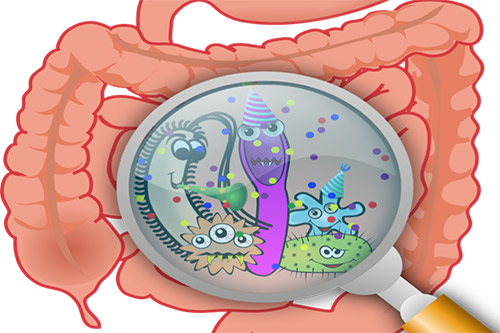Vomiting and diarrhoea are often caused by a gastrointestinal infection (often called gastroenteritis). Examples are:
- Viral infection (e.g. norovirus, rotavirus).
- Bacterial infection (e.g. salmonella, campylobacter). This can be caused by infected food or water and is referred to as ‘food poisoning’ which usually starts within 24 hours of eating infected food.
- Parasite gut infection (e.g. giardia).
Other causes are pregnancy, alcohol, anxiety, medication and certain food intolerances (e.g. lactose).
It is important to note that dehydration can develop quite rapidly, especially in the very young and elderly, and can even be fatal. The avoidance of dairy products is also recommended whilst your diarrhoea is bad. This is because diarrhoea can cause temporary bowel damage, which may interfere with the digestion of lactose.
So, what is your local Friendlies pharmacist likely to recommend for the treatment of vomiting and diarrhoea?
Rehydration
- This is the most important aspect of treatment. Oral rehydration products are available in ready-mixed solutions, ice blocks and tablets/powder for mixing with water.
- It’s important to sip/suck small amounts often, and after a bout of vomiting or a runny bowel motion.
- Even though not routinely recommended, you may use juice, cordial or soft drinks (e.g. lemonade) to replace fluid if vomiting and diarrhoea are very mild. If that is the case, then make sure they are well-diluted with water and do not use diet, sports or energy drinks.
Non-prescription medication
- Upon consultation with your pharmacist, an adult may be given medication to help control diarrhoea (e.g. Loperamide).
- Certain probiotics (e.g. Lactobacillus) may help relieve diarrhoea caused by a viral infection.

Extra Pointers:
- If your affected baby is breastfed, continue breastfeeding whilst offering oral rehydration solution (or boiled and cooled water) between feeds. If they are bottle fed, give oral rehydrating solution instead of formula at first, then restart formula/milk when vomiting has eased (whilst offering small amounts of oral rehydrating solution often).
- Avoid drinks containing a lot of sugar as they can make diarrhoea worse.
- Stay at home when ill.
Seek medical attention if:
- It’s a baby less than 6 months old.
- You are pregnant.
- There is blood in your vomit.
- You have a fever over 38 degrees Celsius.
- You are losing weight.